新概念英语第1册精讲课程
- 格式:pptx
- 大小:2.44 MB
- 文档页数:52
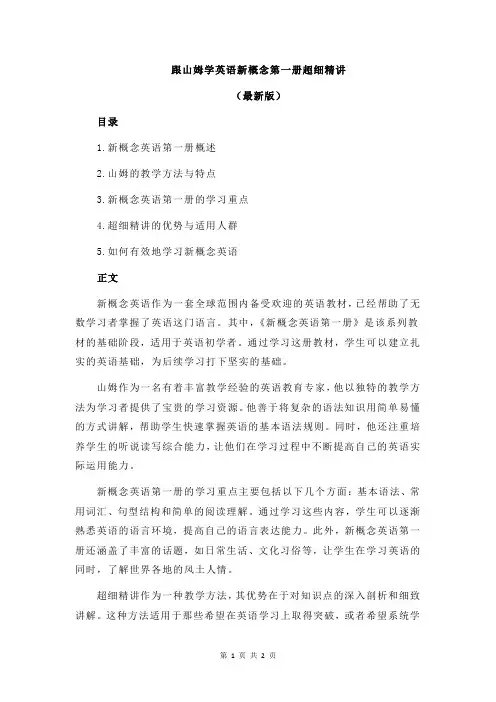
第 1 页 共 2 页 跟山姆学英语新概念第一册超细精讲 (最新版) 目录 1.新概念英语第一册概述 2.山姆的教学方法与特点 3.新概念英语第一册的学习重点 4.超细精讲的优势与适用人群 5.如何有效地学习新概念英语 正文 新概念英语作为一套全球范围内备受欢迎的英语教材,已经帮助了无数学习者掌握了英语这门语言。其中,《新概念英语第一册》是该系列教材的基础阶段,适用于英语初学者。通过学习这册教材,学生可以建立扎实的英语基础,为后续学习打下坚实的基础。
山姆作为一名有着丰富教学经验的英语教育专家,他以独特的教学方法为学习者提供了宝贵的学习资源。他善于将复杂的语法知识用简单易懂的方式讲解,帮助学生快速掌握英语的基本语法规则。同时,他还注重培养学生的听说读写综合能力,让他们在学习过程中不断提高自己的英语实际运用能力。
新概念英语第一册的学习重点主要包括以下几个方面:基本语法、常用词汇、句型结构和简单的阅读理解。通过学习这些内容,学生可以逐渐熟悉英语的语言环境,提高自己的语言表达能力。此外,新概念英语第一册还涵盖了丰富的话题,如日常生活、文化习俗等,让学生在学习英语的同时,了解世界各地的风土人情。
超细精讲作为一种教学方法,其优势在于对知识点的深入剖析和细致讲解。这种方法适用于那些希望在英语学习上取得突破,或者希望系统学 第 2 页 共 2 页
习英语知识体系的学习者。通过超细精讲,学习者可以全面地了解英语的语法规则和运用方法,从而在英语学习中取得更好的成绩。
要想有效地学习新概念英语,首先要找到适合自己的学习方法。有些人喜欢听课,可以选择网络课程或实体课堂;有些人喜欢自学,可以购买教材和辅导书籍。同时,要坚持每天学习,充分利用零碎时间,如上下班途中、等待时间等。此外,多与他人进行英语交流,提高自己的口语水平,也是提高英语能力的重要途径。
总之,《新概念英语第一册》作为英语学习的基础教材,结合山姆的超细精讲教学方法,可以帮助学习者更好地掌握英语知识。
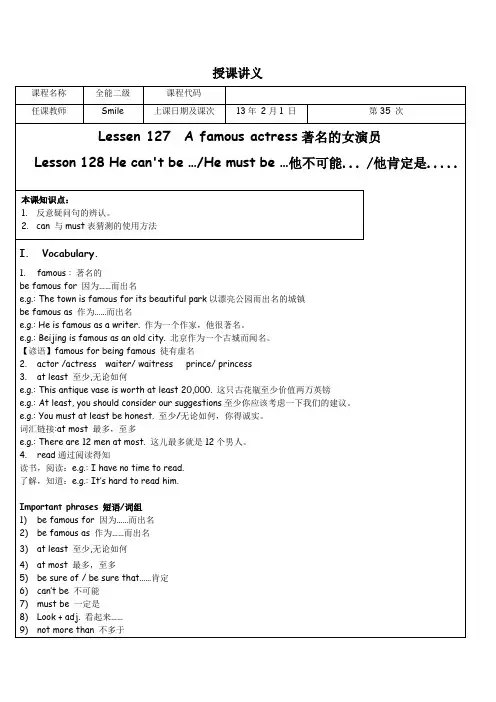
授课讲义I’will,应该放在前面。
It takes a long time. take用于花费时间。
It takes sb. sometime to do sth 做某事需要花费某人多长时间It took me a week to finish this work. 我完成这项工作花了一周的时间。
We might not go anywhere. 我们可能哪也不去,而不是我们不可能去那。
We can’t go anywhere。
In the end adv.最后。
等于at last adv.最后=at the end of sth 在…结尾。
Expressions1. must和have to的用法两者都表示必要性,两者的主要区别在于:1. must表示主观意愿,而have to表示客观事实。
2. must 只用于现在时,而过去时用had to,将来时用will have to。
3. must 不用于否定句,否定句用needn’t 不必要或don’t need to。
mustn’t的意思是不允许,禁止。
2. 情态动词表示推测:情态动词表示推测的有:must一定、could很有可能、may可能、might有一些可能。
它们的用法是:1. 它们表示推测只能用于肯定句之中,而疑问句用can,否定句用can’t不可能。
Can the he stay at home at the moment? 现在他能在家么?He must be staying at home. 他一定在家。
He can’t be staying at home. 他不可能在家。
2. 情态动词用原形,表示对现在或将来的情况时行推测。
He must be a teacher. 他可能是一名老师。
(系表)We may travel by sea next month. 下个月,我们可能乘船旅行。
3. 情态动词用be doing,表示对现在的情况进行推测。
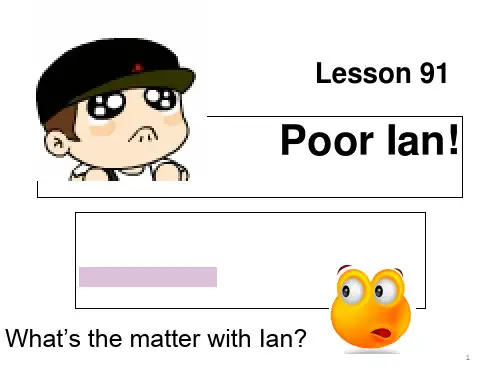
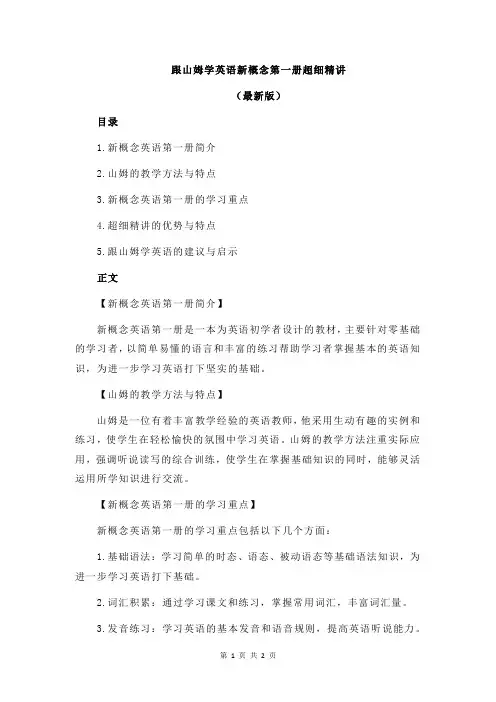
跟山姆学英语新概念第一册超细精讲(最新版)目录1.新概念英语第一册简介2.山姆的教学方法与特点3.新概念英语第一册的学习重点4.超细精讲的优势与特点5.跟山姆学英语的建议与启示正文【新概念英语第一册简介】新概念英语第一册是一本为英语初学者设计的教材,主要针对零基础的学习者,以简单易懂的语言和丰富的练习帮助学习者掌握基本的英语知识,为进一步学习英语打下坚实的基础。
【山姆的教学方法与特点】山姆是一位有着丰富教学经验的英语教师,他采用生动有趣的实例和练习,使学生在轻松愉快的氛围中学习英语。
山姆的教学方法注重实际应用,强调听说读写的综合训练,使学生在掌握基础知识的同时,能够灵活运用所学知识进行交流。
【新概念英语第一册的学习重点】新概念英语第一册的学习重点包括以下几个方面:1.基础语法:学习简单的时态、语态、被动语态等基础语法知识,为进一步学习英语打下基础。
2.词汇积累:通过学习课文和练习,掌握常用词汇,丰富词汇量。
3.发音练习:学习英语的基本发音和语音规则,提高英语听说能力。
4.日常交流:学习简单的日常用语和句型,培养初步的英语交流能力。
【超细精讲的优势与特点】超细精讲是一种针对英语教材进行深入细致讲解的教学方法,其优势与特点表现在以下几个方面:1.细致入微:超细精讲对教材中的知识点进行深入细致的讲解,使学生能够全面掌握所学内容。
2.易懂易学:超细精讲采用生动形象的实例和练习,使学生在轻松愉快的氛围中学习英语。
3.个性化教学:超细精讲根据学生的实际情况和学习需求进行针对性的教学,提高学习效果。
【跟山姆学英语的建议与启示】1.积极参与课堂互动,与老师和同学进行交流,提高英语听说能力。
2.多做练习,巩固所学知识,加深对英语语法和词汇的理解。
3.注重实际应用,将所学知识运用到日常生活中,提高英语实际运用能力。
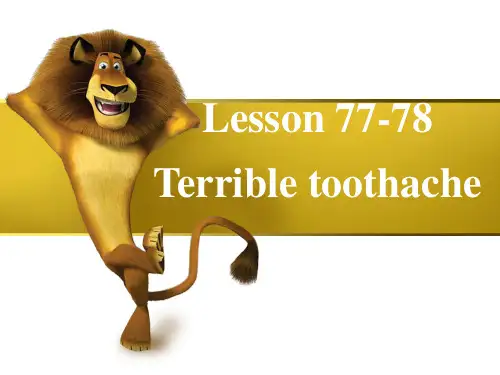
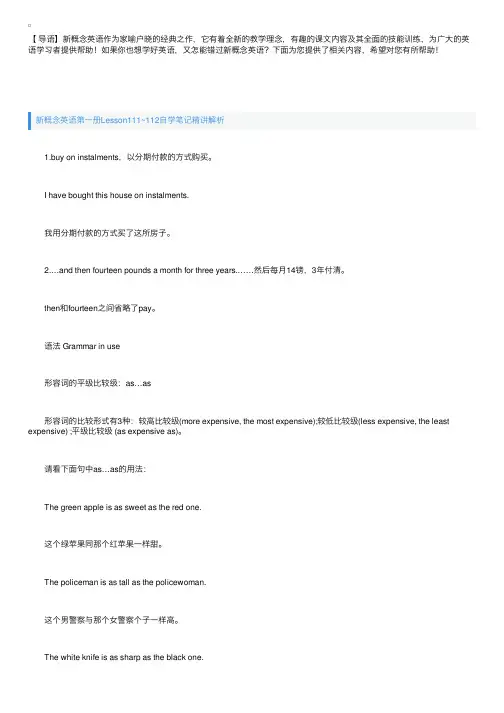
【导语】新概念英语作为家喻户晓的经典之作,它有着全新的教学理念,有趣的课⽂内容及其全⾯的技能训练,为⼴⼤的英语学习者提供帮助!如果你也想学好英语,⼜怎能错过新概念英语?下⾯为您提供了相关内容,希望对您有所帮助!新概念英语第⼀册Lesson111~112⾃学笔记精讲解析 1.buy on instalments,以分期付款的⽅式购买。
I have bought this house on instalments. 我⽤分期付款的⽅式买了这所房⼦。
2.…and then fourteen pounds a month for three years.……然后每⽉14镑,3年付清。
then和fourteen之间省略了pay。
语法 Grammar in use 形容词的平级⽐较级:as…as 形容词的⽐较形式有3种:较⾼⽐较级(more expensive, the most expensive);较低⽐较级(less expensive, the least expensive) ;平级⽐较级 (as expensive as)。
请看下⾯句中as…as的⽤法: The green apple is as sweet as the red one. 这个绿苹果同那个红苹果⼀样甜。
The policeman is as tall as the policewoman. 这个男警察与那个⼥警察个⼦⼀样⾼。
The white knife is as sharp as the black one. 这把⽩⾊的⼩⼑与那把⿊⾊的⼩⼑⼀样锋利。
I don't know as many people as you do. 我认识的⼈没有你认识的多。
Robert is not as old as he looks. 罗伯特没有他看上去那么⾼。
The blue car is not as clean as the red car. 蓝车没有红车⼲净。
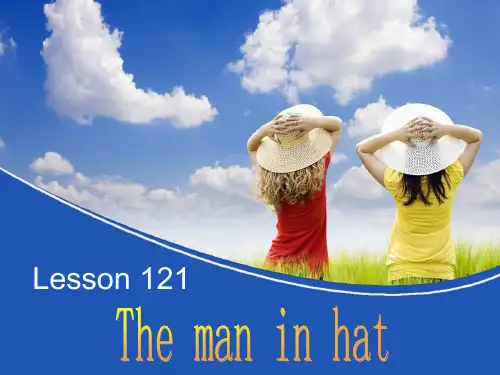
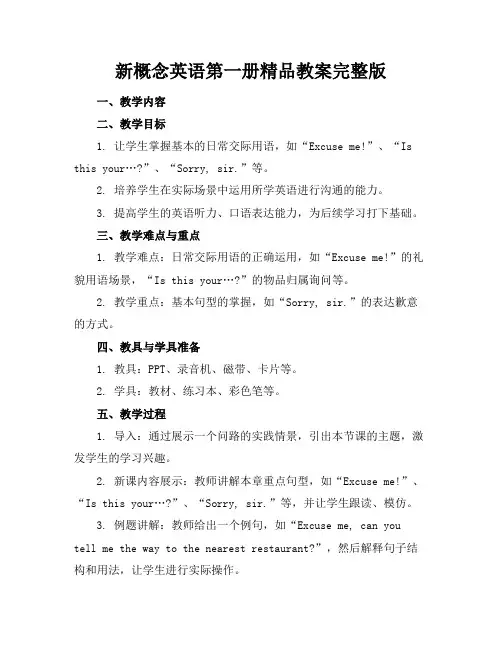
新概念英语第一册精品教案完整版一、教学内容二、教学目标1. 让学生掌握基本的日常交际用语,如“Excuse me!”、“Is this your…?”、“Sorry, sir.”等。
2. 培养学生在实际场景中运用所学英语进行沟通的能力。
3. 提高学生的英语听力、口语表达能力,为后续学习打下基础。
三、教学难点与重点1. 教学难点:日常交际用语的正确运用,如“Excuse me!”的礼貌用语场景,“Is this your…?”的物品归属询问等。
2. 教学重点:基本句型的掌握,如“Sorry,sir.”的表达歉意的方式。
四、教具与学具准备1. 教具:PPT、录音机、磁带、卡片等。
2. 学具:教材、练习本、彩色笔等。
五、教学过程1. 导入:通过展示一个问路的实践情景,引出本节课的主题,激发学生的学习兴趣。
2. 新课内容展示:教师讲解本章重点句型,如“Excuse me!”、“Is this your…?”、“Sorry, sir.”等,并让学生跟读、模仿。
3. 例题讲解:教师给出一个例句,如“Excuse me, can you tell me the way to the nea rest restaurant?”,然后解释句子结构和用法,让学生进行实际操作。
4. 随堂练习:学生分角色进行对话练习,巩固所学知识。
六、板书设计1. 新概念英语第一册 Unit 12. 重点句型:Excuse me!Is this your…?Sorry, sir.3. 例句:Excuse me, can you tell me the way to the nearest restaurant?七、作业设计1. 作业题目:Write down thr ee sentences using “Excuse me!” in different situations.Make a dialogue with your partner using “Is this your…?” to ask about the ownership of objects.Write a short passage about asking for directions and apologize in English.2. 答案:见附件。
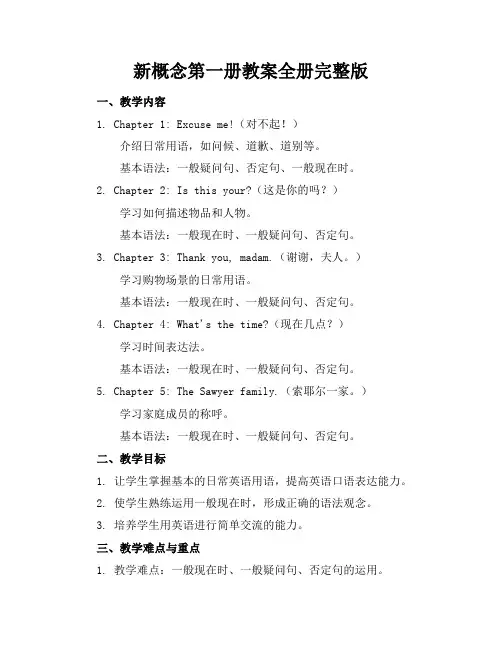
新概念第一册教案全册完整版一、教学内容1. Chapter 1: Excuse me!(对不起!)介绍日常用语,如问候、道歉、道别等。
基本语法:一般疑问句、否定句、一般现在时。
2. Chapter 2: Is this your?(这是你的吗?)学习如何描述物品和人物。
基本语法:一般现在时、一般疑问句、否定句。
3. Chapter 3: Thank you, madam.(谢谢,夫人。
)学习购物场景的日常用语。
基本语法:一般现在时、一般疑问句、否定句。
4. Chapter 4: What's the time?(现在几点?)学习时间表达法。
基本语法:一般现在时、一般疑问句、否定句。
5. Chapter 5: The Sawyer family.(索耶尔一家。
)学习家庭成员的称呼。
基本语法:一般现在时、一般疑问句、否定句。
二、教学目标1. 让学生掌握基本的日常英语用语,提高英语口语表达能力。
2. 使学生熟练运用一般现在时,形成正确的语法观念。
3. 培养学生用英语进行简单交流的能力。
三、教学难点与重点1. 教学难点:一般现在时、一般疑问句、否定句的运用。
2. 教学重点:日常英语用语的掌握。
四、教具与学具准备1. 教具:PPT、黑板、磁带、录音机。
2. 学具:教材、练习册、笔记本。
五、教学过程1. 导入:通过情景剧表演,让学生复习上一课的内容。
2. 新课内容:讲解本章重点单词、短语和句型。
3. 例题讲解:通过例题讲解,让学生理解语法点。
4. 随堂练习:让学生进行口头练习,巩固所学知识。
5. 小组活动:分组讨论,练习本章重点句型。
六、板书设计1. 重点单词、短语。
2. 重点句型。
七、作业设计1. 作业题目:(1)抄写本章重点单词、短语。
(2)用本章所学句型编写一段对话。
(3)完成练习册本章练习。
答案:见练习册答案。
八、课后反思及拓展延伸1. 反思:关注学生在课堂上的表现,及时发现问题,调整教学方法。
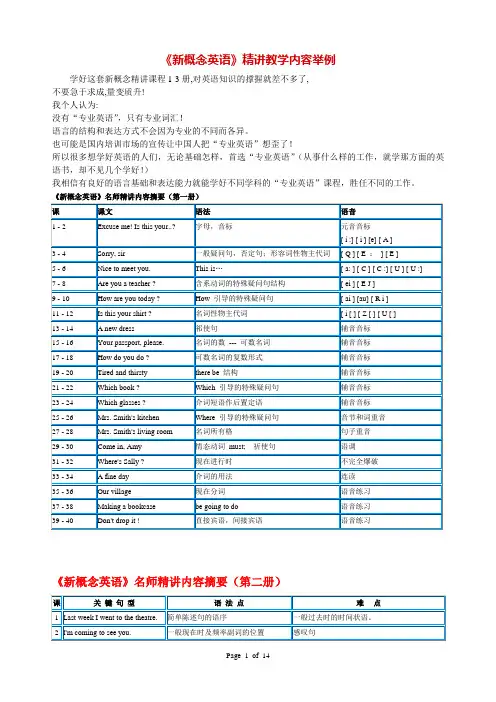
《新概念英语》精讲教学内容举例
学好这套新概念精讲课程1-3册,对英语知识的撑握就差不多了,
不要急于求成,量变质升!
我个人认为:
没有“专业英语”,只有专业词汇!
语言的结构和表达方式不会因为专业的不同而各异。
也可能是国内培训市场的宣传让中国人把“专业英语”想歪了!
所以很多想学好英语的人们,无论基础怎样,首选“专业英语”(从事什么样的工作,就学那方面的英语书,却不见几个学好!)
我相信有良好的语言基础和表达能力就能学好不同学科的“专业英语”课程,胜任不同的工作。
《新概念英语》名师精讲内容摘要(第一册)
《新概念英语》名师精讲内容摘要(第二册)
《新概念英语》名师精讲内容摘要(第三册)。
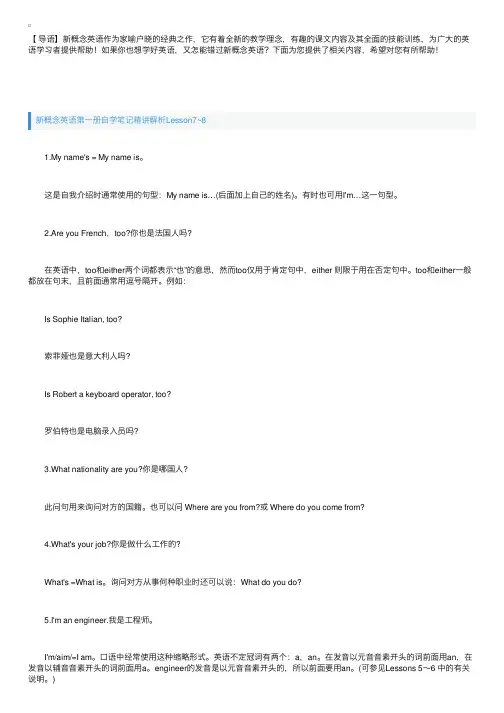
【导语】新概念英语作为家喻户晓的经典之作,它有着全新的教学理念,有趣的课⽂内容及其全⾯的技能训练,为⼴⼤的英语学习者提供帮助!如果你也想学好英语,⼜怎能错过新概念英语?下⾯为您提供了相关内容,希望对您有所帮助!新概念英语第⼀册⾃学笔记精讲解析Lesson7~8 1.My name's = My name is。
这是⾃我介绍时通常使⽤的句型:My name is…(后⾯加上⾃⼰的姓名)。
有时也可⽤I'm…这⼀句型。
2.Are you French,too?你也是法国⼈吗? 在英语中,too和either两个词都表⽰“也”的意思,然⽽too仅⽤于肯定句中,either 则限于⽤在否定句中。
too和either⼀般都放在句末,且前⾯通常⽤逗号隔开。
例如: Is Sophie Italian, too? 索菲娅也是意⼤利⼈吗? Is Robert a keyboard operator, too? 罗伯特也是电脑录⼊员吗? 3.What nationality are you?你是哪国⼈? 此问句⽤来询问对⽅的国籍。
也可以问 Where are you from?或 Where do you come from? 4.What's your job?你是做什么⼯作的? What's =What is。
询问对⽅从事何种职业时还可以说:What do you do? 5.I'm an engineer.我是⼯程师。
I'm/aim/=I am。
⼝语中经常使⽤这种缩略形式。
英语不定冠词有两个:a,an。
在发⾳以元⾳⾳素开头的词前⾯⽤an,在发⾳以辅⾳⾳素开头的词前⾯⽤a。
engineer的发⾳是以元⾳⾳素开头的,所以前⾯要⽤an。
(可参见Lessons 5~6 中的有关说明。
) 6.数字16~20的英⽂写法 16—sixteen 17—seventeen 18—eighteen 19—nineteen 20—twenty 语法 Grammar in use 以疑问词what所引导的特殊疑问句 (可参见 Lessons 5~的有关说明。
Lesson1: Excuse me!Excuse me!Yes?Is this your handbag?Pardon?Is this your handbag?Yes, it is.Thank you very much.Lesson 3:Sorry sir.My coat and my umbrella please. Here is my ticket.Thank you sir.Number five.Here is your umbrella and your coat. This is not my umbrella.Sorry sir.Is this your umbrella?No, it isn't.Is this it?Yes, it is.Thank you very much.Lesson 5: Nice to meet you.Good morning.Good morning, Mr. Blake.This is Miss Sophie Dupont.Sophie is a new student.She is a French.Sophie, this is Hans.He is German.Nice to meet you.And this is Naoko.She’s Japanese.Nice to meet you.And this is Chang-woo.He’s Korean. (朝鲜人)Nice to meet you.And this is Luming.He’s Chinese.Nice to meet you.And this is Xiaohui.She’s Chinese, too.Nice to meet you.Lesson 7: Are you a teacher? I’m a new student.My name’s Robert.Nice to meet you.My name’s Sophie.Are you French?Yes, I’m.Are you French, too?N o, I’m not.What nationality are you? I’m Italian.Are you a teacher?No, I’m not.What’s your job?I’m a keyboard operator. What’s your job?I’m an engineer.Lesson 9: How are you today? Hello, Helen.Hi, Steven.How are you today?I’m very well, Thank you. And you?I’m fine, thanks.How is Tony?He’s fine, Thanks.How’s Emma?She’s very well, too, Helen. Goodbye, Helen.Nice to see you.Nice to see you, too, Steven. Goodbye.Lesson 11: Is this your shirt? Whose shirt is that?Is this your shirt, Dave?No, sir.It’s not my shirt.This is my shirt.My shirt is blue.Is this shirt Tim’s?Perhaps it is, sir.Tim’s shirt is white.Tim!Yes, sir.Is this your shirt?Yes, Sir.Here you are.Catch.Thank you, sir.Lesson 13: A new dressWhat color is your new dress?It is green.Come upstairs and see it. Thanks you.Look!Here it is!That’s a nice dress.It’s very smart.My hat’s new, too.What color is it?It’s the same color.It’s g reen, too.That’s a lovely hat.Lesson 15: Your passport, please. Are you Swedish?No, we are not.We are Danish.Are your friends Danish, too? No, they aren’t.They are Norwegian.Your passport, please.Here they are.Are there your cases?No, they aren’t.Our cases are brown.Here they are.Are you tourists?Yes, we are.Are your friends tourists too?Yes, they are.That’s fine.Thank you very much.Lesson 17: How do you doCome and meet our employees, Mr. Richards. Thank you, Mr. Jackson.This is Nicola Grey, and this is Claire Taylor. How do you do?Those women are very hard-working.What are their jobs?They’re keyboard operators.This is Michael Baker, and this is Jeremy Short. How do you do?They aren’t very busy!What are their jobs?They’re sales reps.They are very lazy.Who is this young man?This is Jim.He is our office assistant.Lesson 19: Tired and thirstyWhat’s the mater, children?We are tired and thirsty, Mum.Sit down here.Are you all right now?No, we aren’t.Look!There’s an ice cream man.Two ice creams please.Here you are, children.Thanks, Mum.These ice creams are nice.Are you all right now?Yes, we are, thank you.Lesson 21: Which book?Give me a book please, Jane.Which book?This one?No, not that one. The red one.This one?Yes, please.Here you are.Thank you.Lesson 23: Which glasses?Give me some glasses please, Jane. Which glasses?These glasses.No, not those. The ones on the shelf. These?Yes, please.Here you are.Thanks.Lesson25: Mrs. Smith’s kitchenMrs. Smith’s kitchen is small.There is a refrigerator in the kitchen.The refrigerator is white.It is on the right.There is an electric cooker in the kitchen. The cooker is blue.It is on the left.There is a table in the middle of the room. There is a bottle on the table.The bottle is empty.There is a cup on the table, too.The cup is clean.Lesson 27: Mrs. Smith’s living roomMrs. Smith’s living room is large.There is a television in the room.The television is near the window.There are some magazines on the television. There is a table in the room.There are some newspapers on the table.There are some armchairs in the room.The armchairs are near the table.There is a stereo in the room.The stereo is near the door.There are some books on the stereo.There are some pictures in the room.The pictures are on the wall.Lesson 29: Come in, Amy.Come in, Amy.Shut the door, please.This bedroom is very untidy.What must I do, Mrs. Jones?Open the window and air the room.Then put these clothes in the wardrobe.(衣橱)Then make the bed.Dust the dressing table.Then sweep the floor.Lesson31: Where’s Sally?Where’s Sally, Jack?She’s in the garden, Jane.What’s she doing?She’s sitting under the tree.Is Tim in the garden, too?Yes, he is.He’s climbing the tree.I beg your pardon?Who’s climbing the tree.Tim is.What about the dog?The dog’s in the garden, too.It’s running across the grass.It’s running after a cat.Lesson 33: A fine dayIt’s a fine day today.There are some clouds in the sky, but the sun is shining. Mrs. Jones’s with his family.They are walking over the bridge.There are some boats on the river.Mrs. Jones and his wife are looking at them.Sally is looking at a big ship.The ship is going under the bridge.Tim is looking at an aeroplane.The aeroplane is flying over the river.Lesson 35: Our villageThis is a photograph of our village.Our village is in a valley.It is between two hills.The village is on a river.Here is another photograph of the village.My wife and I are walking alone the banks of the river. We are on the left.There is a boy in the water.He is swimming across the river.Here is another photograph.This is the school building.It is beside a park.The park is on the right.Some children are coming out of the building.Some of them are going into the park.Lesson37: Making a bookcaseYou’re working hard, George.What are you doing?I’m making a bookcase.Give me that hammer please, Dan.Which hammer.This one?No, not that one.The big one.Here you are.Thanks, Dan.What are you going to do now, George?I’m going to paint it.What colour are you going to paint it?I’m going to paint it pink.Pink!This bookcase isn’t for me.It’s for my daughter, Susan.Pink’s her favorite colour.Lesson39: Do n’t drop it!What are you going to do with that vase, Penny? I’m going to put it on this table, Sam.Don’t do that.Give it to me.What are you going to do with it?I’m going to put it here, in front of the window. Be careful.Don’t drop it!Don’t put it there, Sam.Put it here, on this shelf.There we are!It’s a lovely vase.Those flowers are lovely, too.Lesson41: Penny’s bagIs that bag heavy, Penny?Not very.Here!Put it on this chair.What’s in it?A piece of cheese.A loaf of bread.A bar of soap.A bar of chocolate.A bottle of milk.A pound of sugar.Half a pound of coffee.A quarter of a pound of tea.And a tin of tobacco.Is that tin of tobacco for me?Well, it’s certainly not for me!Lesson43: Hurry up!Can you make the tea, Sam?Yes, of course I can, Penny.Is there any water in this kettle(水壶)?Yes, there is.Where’s the tea?It’s over there, behind the teapot.Can you see it?I can see the teapot, but I can’t see the tea.There it is!It’s in front of you.Ah yes, I can see it now.Where are the cups?There are some in the cupboard(碗橱).Can you find them?Yes. Here they are.Hurry up, Sam.The kettle’s boiling.lesson45THE BOSS: Can you come here a minute please, Bob?Bob: Yes, sir?THE BOSS: Where's Miss Jones?Bob: She's next door. She's in her office, sir.THE BOSS: Can she type this letter for me? Ask her please. Bob: Yes, sir.Bob: Can you type this letter for the boss please, Miss Jones? MISS JONES: Yes, of course I can.Bob: Here you are.MISS JONES: Thank you, Bob.MISS JONES: Bob!Bob: Yes? What's the matter?MISS JONES: I can't type this letter.Miss Jones: I can't read it! The boss's handwriting is terrible! lesson47 A cup of coffeeMRS YOUNG: Do you like coffee, Mrs Price?MRS PRICE: Yes, I do.MRS YOUNG: Do you want a cup?MRS PRICE: Yes, please. Mrs Young.MRS YOUNG: Do you want any sugar?MRS PRICE: Yes, please.MRS YOUNG: Do you want any milk?MRS PRICE: No, thank you. I don't like milk in my coffee.I like black coffee.MRS YOUNG: Do you like biscuits?MRS PRICE: Yes, I do.MRS YOUNG: Do you want one?MRS PRICE: Yes, please.lesson49 At the butcher’sBUTCHER: Do you want any meat today, Mrs Bird?MRS BIRD: Yes, please.BUTCHER: This lamb's very good.MRS BIRD: I like lamb, but my husband doesn't .BUTCHER: What about some steak? This is a nice piece.MRS BIRD: Give me that piece please.BUTCHER: Do you want a chicken, Mrs Bird? They're very nice.MRS BIRD: No, thank you.MRS BIRD: My husband likes steak, but he doesn't like chicken. BUTCHER: To tell you the truth(说实在的), Mrs. Bird, I don't like chicken, either !lesson51 A pleasant climateHANS: Where do you come from?DIMITRI: I come from Greece.HANS: What's the climate like in your country?DIMITRI: It's very pleasant.Hans: What's the weather like in spring?DIMITRI: It's often windy in March. It's always warm in April and May, but it rains sometimes.HANS: What's it like in summer?DIMITRI: It's always hot in June, July and August. The sun shines every day.HANS: Is it cold or warm in autumn?DIMITRI: It's always warm in September and October. It's often cold in November and it rains sometimes.HANS: Is it very cold in winter?DIMITRI: It's often cold in December, January and February. It snows sometimes.lesson53 An interesting climateHANS: Where do you come from?JIM: I come from England.HANS: What's the climate like in your country?Jim: It's mild(温和的), but it's not always pleasant.Jim: The weather's often cold in the North and windy in the East. It's often wet in the West and sometimes warm in the South.Hans: Which seasons do you like best?Jim: I like spring and summer. The days are long and the nights are short. The sun rises early and sets late. I don't like autumn andwinter. The days are short and the nights are long. The sun riseslate and sets early. Our climate is not very good, but it's certainlyinteresting. It's our favorite subject of conversation.lesson55 The Sawyer familyThe Sawyers live at 87 King Street.In the morning, Mrs Sawyer goes to work and the children go to school. Their father takes them to school every day.Mrs Sawyer stays at home every day. She does the housework. She always eats her lunch at noon.In the afternoon, she usually sees her friends. They often drink tea together.In the evening, the children come home from school. They arrive home early.Mr Sawyer comes home from work. He arrives home late.At night, the children always do their homework. Then they go to bed. Mr Sawyer usually reads his newspaper, but sometimes he and his wife watch television.lesson57 An unusual dayIt is eight o'clock. The children go to school by car every day, but today, they are going to school on foot.It is ten o'clock. Mrs Sawyer usually stays at home in the morning, but this morning, she is going to the shops.It is four o’clock. In the afternoon, Mrs Sawyer usually drinks tea in the living-room, but this afternoon, she is drinking tea in the garden.It is six o’clock. In the evening, the children usually do their homework, but this evening, they are not doing their homework. At the moment, they are playing in the garden.It is nine o’clock, Mr. Sawyer usually reads his newspaper at night, but he is not reading his newspaper tonight. At the moment, he is reading an interesting book.lesson59 Is that all?LADY: I want some envelopes please.STATIONER: Do you want the large size, or the small size?LADY: The large size please.LADY: Have you any writing-paper(信纸)?Stationer: Yes, we do.Stationer: I haven't any small pads. I only have large ones. Do you want a pad (便签簿)?LADY: Yes, please.LADY: And I want some black ink and some glue.Stationer: A bottler of ink and a bottle of glue.LADY: And I want a large box of chalk, too.Stationer: I only have small boxes. Do you want one?LADY: No, thank you.Stationer: Is that all?LADY: That's all, thank you.Stationer: What else do you want?LADY: I want my change.lesson61MR WILLIANMS: Where's Jimmy?MRS WILLIAMS: He's in bed.MR WILLIAMS: What's the matter with him?MRS WILLIAMS: He feels ill.MR WILLIAMS: He looks ill.MRS WILLIAMS: We must call the doctor.MR WILLIAMS: Yes, we must.MR WILLIAMS: Can you remember the doctor's telephone number?MRS WILLIAMS: Yes. It's 09754.DOCTOR: Open your mouth, Jimmy. Show me your tongue. Say, 'Ah'.MR WILLIMAMS: What's the matter with him, doctor?DOCTOR: He has a bad cold, Mr Williams, so he must stay in bed for a week.MRS WILLIAMS: That's good news for Jimmy.DOCTOR: Good news? Why?MR WILLIAMS: Because he doesn't like school!lesson63 Thank you , doctor.DOCTOR: How's Jimmy today?MRS WILLIAMS: He's better , thank you, doctor.DOCTOR: Can I see him please, Mrs Williams?MRS WILLIAMS: Certainly, doctor. Come upstairs.DOCTOR: You look very well, Jimmy. You are better now, but you mustn't get up yet.You must stay in bed for another two days.DOCTOR: The boy mustn't go to school yet, Mrs Williams. And he mustn't eat rich food.Mrs Williams: Does he have a temperature, doctor?Doctor: No, he doesn’t.MRS WILLIAMS: Must he stay in bed?DOCTOR: Yes. He must remain in bed for another two days. He can get up for about two hours each day, but you must keep the room warm. DOCTOR: Where's Mr Williams this evening?MRS WILLIAMS: He's in bed, doctor.Can you see him, please? He has a bad cold, too!lesson65 Not a babyFATHER: What are you going to do this evening, Betty?Betty: I'm going to meet some friends, Dad.FATHER: You mustn't come home late. You must be home at half past ten. BETTY: I can’t get home so early, Dad.Can I have the key to the front door, please?FATHER: NO, you can't.MOTHER: Betty's eighteen years old, Tom. She's not a baby. Give her the key.She always comes home early.FATHER: Oh, all right!FATHER: Here you are. But you mustn't come home after a quarter past eleven.Do you hear?BETTY: Yes, Dad.BETTY: Thanks, Mum.MOTHER: That's all right. Goodbye. Enjoy yourself!BETTY: We always enjoy ourselves, Mum. Bye, bye.lesson67 The weekendMRS JOHNSON: Hello, Mrs Williams. Were you at the butcher's?MRS WILLIAMS: Yes. I was. Were you at the butcher’s ,too?MRS JOHNSON: No, I wasn’t. I was at the greengrocer’s. How’s Jimmy today?MRS WILLIAMS: He’s very well, thank you.MRS JOHNSON: Was he absent from school last week?MRS WILLIAMS: Yes, he was. He was absent on Monday, Tuesday,Wednesday and Thursday. How are you all keeping?(你们身体怎么样?)MRS JOHNSON: Very well, thank you. We’re going to spend three days in thecountry. We’re going to stay at my mother’s for the week-end. MRS WILLIAMS: Friday, Saturday and Sunday in the country! Aren’t you lucky!Lesson69 The car raceThere is a car race near our town every year. In 1968, there was a very big race. There were hundreds of people there. My wife and I were at the race. Our friends, Julie and Jack were there, too. You can see us in the crowd. We are standing on the left.There were twenty cars in the race. There were English cars, French cars, German cars, Italian cars, American cars and Japanese cars.It was an exciting finish. The winner was Billy Stewart. He was in car number fifteen. Five other cars were just behind him.On the way home, my wife said to me, “Don’t drive so quickly! You’re not Billy Stewart!”Lesson 71 He’s awfulJane : What’s Ron Marston like , Pauline ?Pauline : He’s awful ! He telephoned me four times yesterday , and three times the day before yesterday.Pauline: He telephoned the office yesterday morning and yesterday afternoon. My boss answered the telephone .Jane : What did your boss say to him ?Pauline: He said ,”Miss White is typing letters .She can’t speak to you now !”Pauline : Then I arrived home at six o’clock yesterday evening .He telephoned again .But I didn’t answer the phone !Jane : Did he telephone again last night ?Pauline : Yes , he did . He telephoned at nine o’clock .Jane : What did you say to him ?Pauline : I said ,”This is Pauline ‘s mother . Please don’t telephone my daughter again !”Jane : Did he telephone again ?Pauline : No , he didn’t !Lesson73 The way to King StreetLast week Mrs Mills went to London. She does not know London very well, and she lost her way.Suddenly, she saw a man near a bus-shop. “ I can ask him the way.” She sa id to herself.“Excuse me,” she said.“Can you tell me the way to King Street please?”The man smiled pleasantly. He did not understand English! He spoke German. He was a tourist.Then he put his hand into his pocket, and took out a phrase-book.He opened the book and found a phrase. He read the phrase slowly.“I am sorry,” he said. “ I do not speak English.”Lesson 75 Uncomfortable shoesLADY : Have you any shoes like these?SALESMAN: What size?Lady: Size five.Salesman: What colour?Lady: Black.Salesman: I’m sorry. We haven’t any.Lady: But my sister bought this pair last month.Salesman: Did she buy them here?Lady: No, she bought them in the U.S.Salesman: We had so me shoes like those a month ago, but we haven’t any now. Lady: Can you get a pair for me please?Salesman: I’m afraid that I can’t. They were in fashion last year and the year before last.But they’re not in fashion this year.Salesman: These shoes are in fashion now.Lady: They look very uncomfortable.Salesman: They are very uncomfortable. But women always wear uncomfortable shoes!Lesson77 Terrible toothacheNurse: Good morning, Mr Croft.Mr Croft: Good morning, nurse. I want to see the dentist, please.Nurse: Have you an appointment?(有预约吗?)Mr Croft: No, I haven’t .Nurse: Is it urgent?Mr Croft: Yes, it is . It’s very urgent. I feel awful. I have a terrible toothache. Nurse: Can you come at 10 am on Monday, April 24th?Mr Croft: I must see the dentist now, nurse.Nurse: The dentist is very busy at the moment. Can you come at 2:00 PM? Mr Croft: That’s very late. Can’t the dentist see me now?Nurse: I’m afraid that he can’t , Mr Croft. Can’t you wait till this afternoon?Mr Croft: I can wait, but my toothache can’t !Lesson79 Peggy’s shopping-listTom: What are you doing, Peggy?Peggy: I’m making a shopping-list, Tom.Tom: What do we need?Peggy: We need a lot of things this week.Peggy: I must go to the grocer’s. We haven’t got much tea or coffee, and we haven’t got any sugar or jam.Tom: What about vegetables?Peggy: I must go to the greengrocer’s. We haven’t got many tomatoes, but we’ve got a lot of potatoes.Peggy: I must go to the butcher’s, too. We need some meat. We haven’t got any meat at all.Tom: Have we got any beer and wine?Peggy: No, we haven’t. And I’m not going to get any!Tom: I hope that you’ve got some money.Peggy: I haven’t got much.Tom: Well, I haven’t got much either!Lesson81 Roast beef and potato.John: Hello, Peggy! Where’s Tom?Peggy: He’s upstairs. He’s havin g a bath.Peggy: Tom!Tom: Yes?Peggy: John’s here.Tom: I’m nearly ready.Tom: Hello, John. Have a cigarette.John: No thanks, Tom.Tom: Have a glass of whisky then.John: O.K. Thanks.Tom: Is dinner ready, Peggy?Peggy: It’s nearly ready. We can have dinner at seven o’clock.Tom: John and I had lunch together today. We went to a restaurant.Peggy: What did you have?Tom: We had roast beef and potatoes.Peggy: Oh!Tom: What’s the matter, Peggy?Peggy: Well, you’re going to have roast beef and potatoes again tonight!Lesson83 Going on a holidayPeggy: Hello, John. Come in.Tom: Hello, John. We’re having lunch. Do you want to have lunch with us? John: No thank you, Tom. I’ve already had lunch. I had lunch at half past twelve. Peggy: Have a cup of coffee then.John: I’ve just had a cup, thank you. I had one after my lunch.Tom: Let’s go into the living-room, Peggy. We can have our coffee there. Peggy: Excuse the mess, John. This room’s very untidy. We’re packing our suitcases. We’re going to leave tomorrow. Tom and I are going to have aholiday.John: Aren’t you lucky!Tom: When are you going to have a holiday, John?John: I don’t know. I’ve already had my holiday this year.Peggy: Where did you go?John: I stayed at home!Lesson85 Paris in the SpringGeorge: Hello, Ken.Ken: Hello, George.George: Have you just been to the cinema?Ken: Yes, I have.George: What’s on?Ken: “Paris in the Spring”.George: Oh, I’ve already seen it. I saw it on a B.B.C. television programme last year.It’s an old film, but it’s very good.Ken: Paris is a beautiful city.George: I have never been there. Have you ever been there, Ken?Ken: Yes, I have. I was there in April.George: Paris in the spring, eh?Ken: It was spring, but the weather was awful. It rained all the time.George: Just like dear old London!Lesson87 A car crashMr Wood: Is my car ready yet?Attendant: I don’t know, sir.What’s the licence number of your car?Mr Wood: It’s LFZ 312 G.Attendant: When did you bring it to us?Mr Wood: I bought it hear three days ago.Attendant: Ah yes, I remember now.Mr Wood: Have your mechanics finished yet?Attendant: No, they’re still working on it. Let’s go into the garage and have a look at it.Attendant: Isn’t that your car?Mr Wood: Well, it was my car.Attendant: Didn’t your wife have a crash?Mr Wood: That’s right. She drove it into a lamp post(电线杆). Can your mechanics repair it?Attendant: Well, they’re trying to repair it, sir. But to tell you the truth, you need a new car.Lesson89 For saleMr Hill: Good afternoon. I believe that this house is for sale(待售).Mr West: That’s right.Mr Hill: May I have a look at it please?Mr West: Yes, of course. Come in.Mr Hill: How long have you lived here?Mr West: I have lived here for twenty years.Mr Hill: Twenty years! That’s a long time.Mr West: Yes, I have been here since 1947.Mr Hill: Then why do you want to sell it?Mr West: Because I have just retired. I want to buy a small house in the country. Mr Hill: How much does this house cost?Mr West: £6850.Mr Hill: That’s a lot of money!Mr West: It’s worth every penny of it.Mr Hill: Well, I like the house, but I can’t decide yet. My wife must see it first. Mr West: Women always have the last word.Lesson91 Poor WestMrs Smith: Has Mr West sold his house yet?Mrs Brown: Yes, he has. He sold it last week.Mrs Smith: Has he moved to his new house yet?Mrs Brown: No, not yet. He’s still here. He’s going to move tomorrow.Mrs Smith: When? Tomorrow morning?Mrs Brown: No. Tomorrow afternoon. I’ll miss him. He has always been a good neighbour.Mrs Green: He’s a very nice person. We shall all miss him.Mrs Smith; When will the new people move into this house?Mrs Brown: I think that they will move in the day after tomorrow.Mrs Green: Will you see Mr West today, Mrs Brown?Mrs Brown: Yes, I will.Mrs Green: Please give him my regards. (give one’s regards to sb.向sb.问候)Mr Smith: Poor Mr West! He didn’t want to leave this house.Mrs Brown: No, he didn’t want to leave, but his wife did!Lesson93 Our new neighborMr Hill is our new next-door neighbour. He’s a p ilot.He was in the R.A.F.(皇家空军)He will fly to New York next month.The month after next he will fly to Tokyo.At the moment(现在), he’s in Madrid. He flew to Spain a week ago.He will return to London the week after next.He’s only forty-one years old, and he has already been to nearly every country in the world.Mr Hill is a very lucky man. But his wife isn’t very lucky. She usually stays at home!Lesson95 Ticket, please.George: Two return tickets to London please. What time will the next train leave?Attendant: At nineteen minutes past eight.George: Which platform?Attendant: Platform Two. Over the bridge.Ken: What time will the next train leave?George: At eight nineteen.Ken: We’ve got plenty of time.George: It’s only three minutes to eight.Ken: Let’s go and have a drink. There’s a bar next door to the station. George: We had better go back to the station now, Ken.Porter: Tickets please.George: We want to catch the eight nineteen to London.Porter: You’ve just missed it!George: What! It’s only eight fifteen.Porter: I’m sorry, sir. That clock’s ten minutes slow.George: When’s the n ext train?Porter: In five hours’ time!Lesson97 A small blue caseMr Hall: I left a suitcase on the train to London the other day.Attendant: Can you describe it, sir?Mr Hall: It’s a small blue case and it’s got a zip. There’s a label on the handle with my name and address on it.Attendant: Is this case yours?Mr Hall: No, that’s not mine.Attendant: What about this one? This one’s got a label.Mr Hall: Let me see it.Attendant: What’s you name and address?Mr Hall: David Hall,83, Bridge Street.Attendant: That’s right.D.N.Hall.83.Bridge Street.Attendant: Three pound and fifty pence please.Mr Hall: Here you are.Attendant: Thank you.Mr Hall: Hey!Attendant: What’s the matter?Mr Hall: This case doesn’t belong to me! You’ve given me the wrong case!Lesson99 Ow!Ted : Ow!Pat: What’s the matter, Ted?Ted: I slipped and fell downstairs.Pat: Have you hurt yourself?Ted: Yes, I have. I think that I’ve hurt my back.Pat: Try and stand up. Can you stand up?Here. Let me help you.Ted: I’m sorry, Pat. I’m afraid that I can’t get up.Pat: I think that the doctor had better see you. I’ll telephone Dr Carter. Pat: The doctor says that he will come at once. I’m sure that you need an X-ray, Ted.Lesson101 A card from JimmyGrandmother: Read Jimmy’s card to me please, Mary.Mary: “I have just arrived in Scotland and I’m staying at a Youth Hostel.”Grandmother: Eh?Mary: He says he’s just arrived in Scotland.H e says he’s staying at a Youth Hostel.You know he’s a member of the Y.H.A.Grandmother: The what?Mary: The Y.H.A., mother. The Youth Hostel’s Association. Grandmother: What else does he say?Mary: “I’ll write a letter soon. I hope you are all well.”Grandmother: What? Speak up, Mary. I’m afraid I can’t hear you.Mary: He says he’ll write a letter soon. He hopes we are all well. “ Love, Jimmy.”Grandmother: Is that all? He doesn’t say very much, does he?Mary: He can’t write very much on a card, mother.Lesson103 The Intelligence testHarry: How was the examination, Dick?Dick: Not too bad. I think I passed in English and Mathematics. The questions were very easy. How about you, Harry?Harry: The English and Maths papers weren’t easy enough for me. I hope I haven’t failed.。
【导语】新概念英语作为家喻户晓的经典之作,它有着全新的教学理念,有趣的课⽂内容及其全⾯的技能训练,为⼴⼤的英语学习者提供帮助!如果你也想学好英语,⼜怎能错过新概念英语?下⾯为您提供了相关内容,希望对您有所帮助!新概念英语第⼀册Lesson43~44⾃学笔记精讲解析 1.Can you make the tea, Sam? 你会沏茶吗,萨姆? make the tea,沏茶。
句中can是英语中最常见的⼏个情态助动词之⼀,请参见本课语法部分。
2.behind,在……的后⾯。
与in front of(在……前⾯)互为反义词。
3.The kettle's boiling!⽔开了! 这⾥的kettle =water in the kettle。
⽤容器来指代容器内的东西是⼀种修辞格,叫借代 语法 Grammar in use can(1) can是英语中最常⽤的⼏个情态助动词之⼀,它本⾝不表⽰动作,只表⽰体⼒或脑⼒⽅⾯的能⼒或客观可能等。
它必须与其他动词连⽤,本⾝没有性和数的变化。
如: I can see some coffee on the table. 我能看到桌⼦上的⼀些咖啡。
Can Sam read this book? 萨姆看得懂这本书吗? can的否定形式为can not, cannot或can't(省略式): I can't see any coffee. 我看不见什么咖啡。
He can't find the cups. 他找不到杯⼦。
词汇学习 Word study 1.find v. 找到;寻得: It is most important to find a suitable person for the job. 找到⼀位适合做这项⼯作的⼈是⾄关重要的。
Where are the cups? I can't find them. 杯⼦放在哪⼉?我找不到。